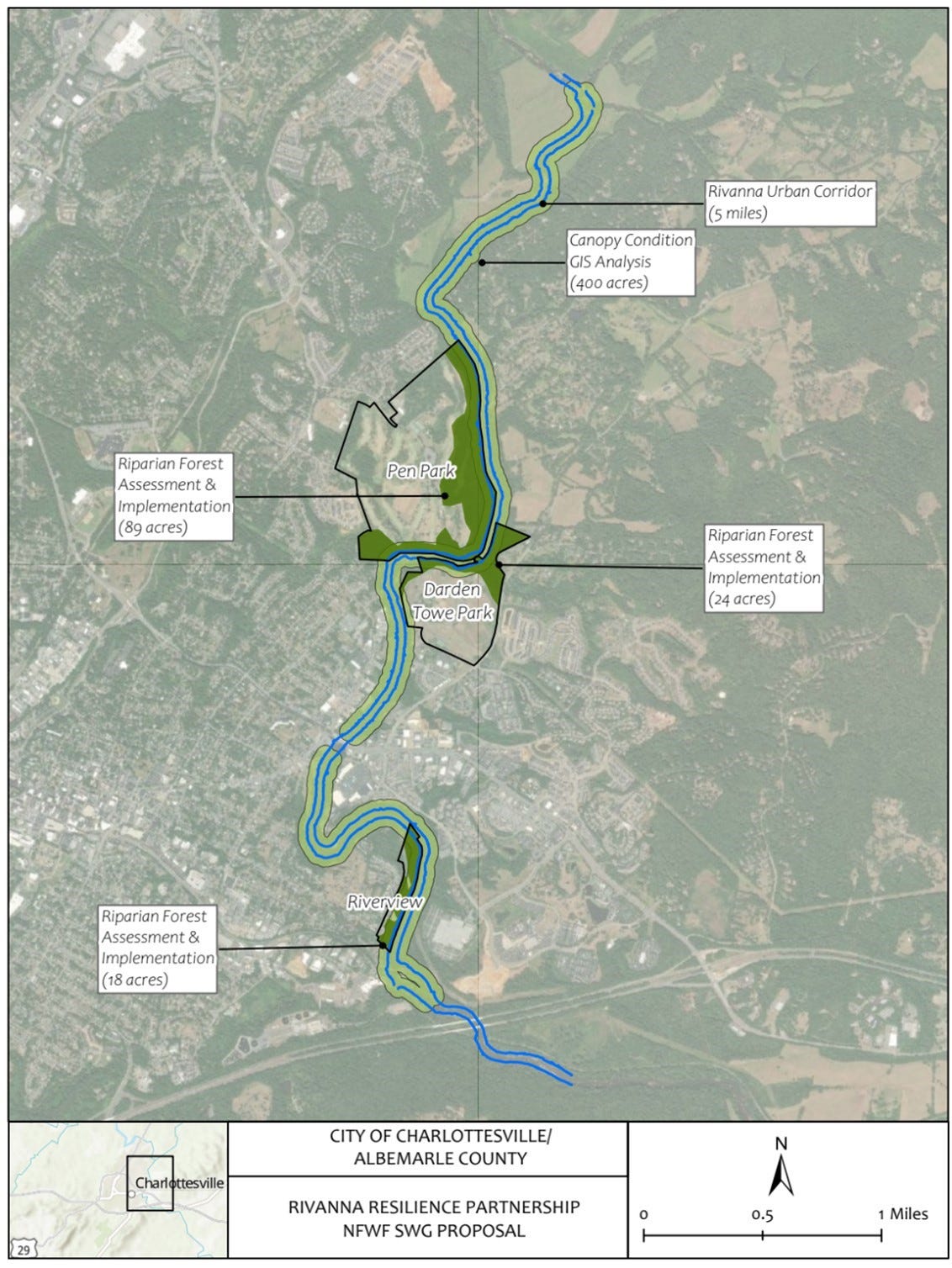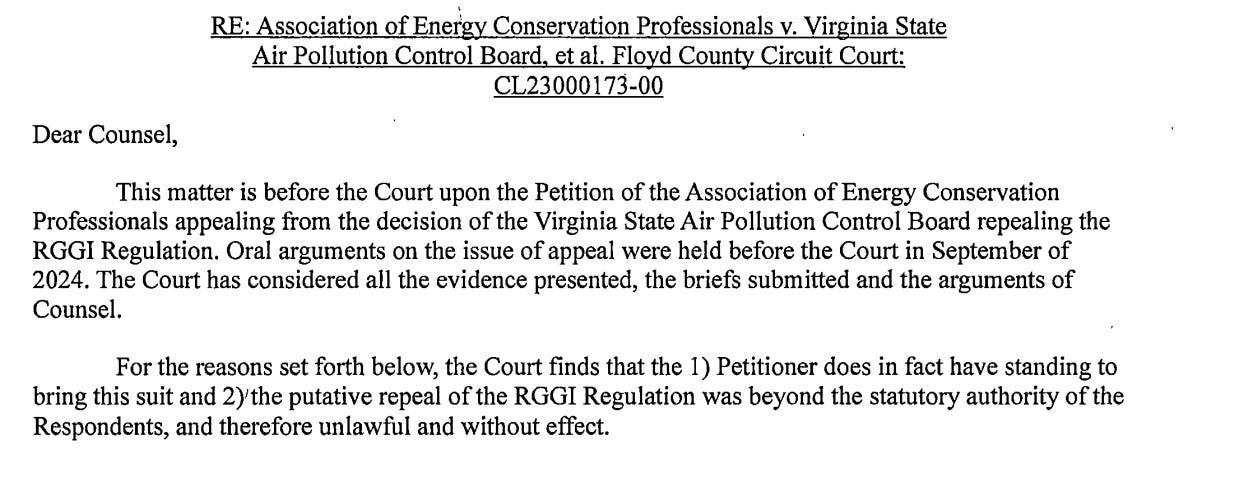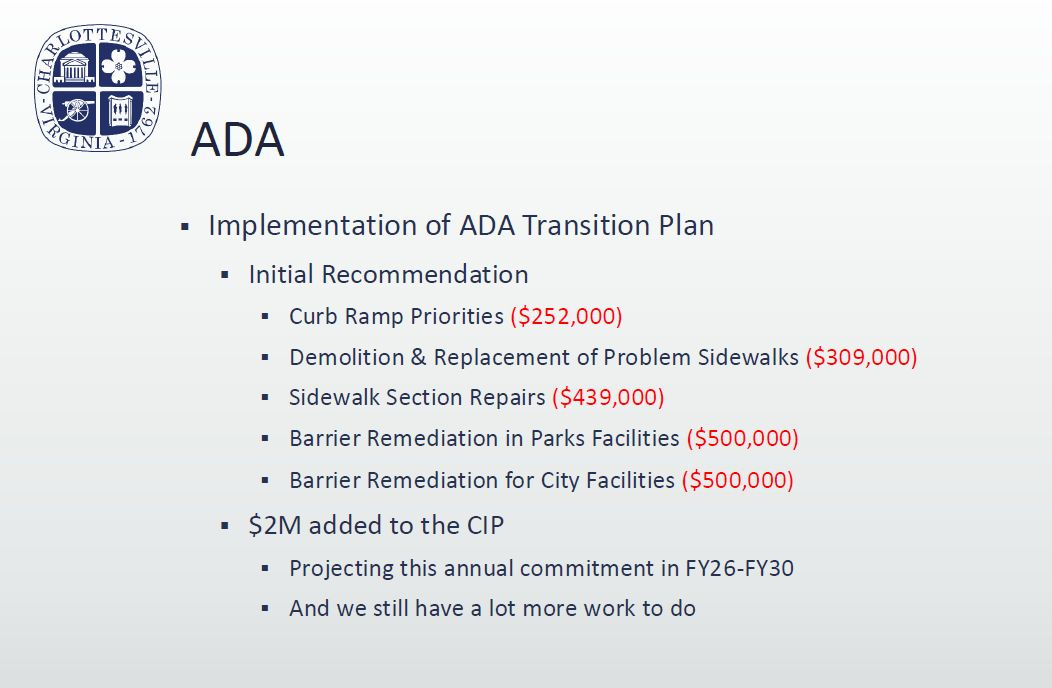November 21, 2024: City Manager Sanders provides more details on expected new spending in FY26 budget
Plus: Information on two lawsuits previously reported in this newsletter
And then just like that, November 21 arrives in a fairly un-ceremonial fashion. Some among us may be confused that it feels like it should be Thanksgiving, but that’s not for another week. Some among us may still be pining for the return of October for just a little more of that Halloween spirit. Others are well along in their celebration of Christmas and other winter holidays. This is Charlottesville Community Engagement, a newsletter and sometimes podcast that believes all days are worth remembering. I’m Sean Tubbs, noting we’re a month out from the solstice.
In today’s installment:
The Arlington County Board votes to appeal a Fairfax County Judge’s ruling against their Expanded Housing Option
A retired Floyd County Judge has ruled that the Youngkin administration did not have the authority to remove Virginia from the Regional Greenhouse Gas Initiative
Charlottesville City Council gets the first of three budget briefings intended to get their initial response to proposed new spending
First-shout: Rivanna River Restoration Project underway at Riverview Park
In today’s first Patreon-fueled public service announcement: The Rivanna Conservation Alliance is leading a public-private partnership to help restore the health of the Rivanna River at Charlottesville’s Riverview Park.
This comprehensive initiative aims to restore critical sections of riverbank, enhance water quality and native habitat, repair a severely eroding stormwater outfall, and provide more opportunities for the community to safely access the river in one of the Charlottesville area’s most cherished natural recreational areas. The work is being done in conjunction with the City of Charlottesville and local design firms Ecosystem Services and Wolf Josey Landscape Architects.
To follow the progress of the project, visit the RCA’s website at rivannariver.org.
Arlington to appeal of judicial ruling invalidating middle missing zoning
Many communities across Virginia have altered their rules on development and land use in order to make it easier for more dwelling units to be built on what had traditionally been reserved for single family housing.
Not everyone is in agreement and have pursued relief in the legal system including a group of Charlottesville property owners whose suit against the city’s new development code has recently been allowed to continue due to a ruling by Charlottesville Circuit Court Judge Claude Worrell.
In late September, retired Fairfax Circuit Court Judge David Schell ruled in favor of plaintiffs who sued over Arlington County’s Expanded Housing Option program which made development of six-unit buildings by-right under certain scenarios. A written opinion was issued in late October.
That began the 30-day clock for Arlington to decide whether they should appeal Judge Schell’s ruling. On Tuesday, the County Board directed their legal staff to move forward with one.
“Since late September, the Board has deliberated on this ruling in the Expanded Housing Option development trial,” said Libby Garvey, the Chair of the Arlington Board. “The Board considered adopting a revised ordinance but determined it is not feasible to do so based under the legal construction and substance of the judge’s ruling.”
Garvey said the Board is concerned that the ruling could affect other land use regulations across the Commonwealth.
“These concerns must be addressed and clarified by a higher court,” Garvey said.
Since the Board’s vote on Tuesday night, Arlington has launched a website with information about the five day trial and the county’s appeal.
“Using data from previous neighborhood parking capacity survey, the County was able to conclude that EHO development would have a marginal effect on parking capacity in the low residential districts, where parking averages at 26 percent capacity,” reads one bit of evidence that had been presented on day four of the trial.
There is no date set for another hearing in the White v. Charlottesville. This week, the attorney for the plaintiffs said he expected to submit more evidence. For more, take a look at the article I wrote this week for C-Ville Weekly.
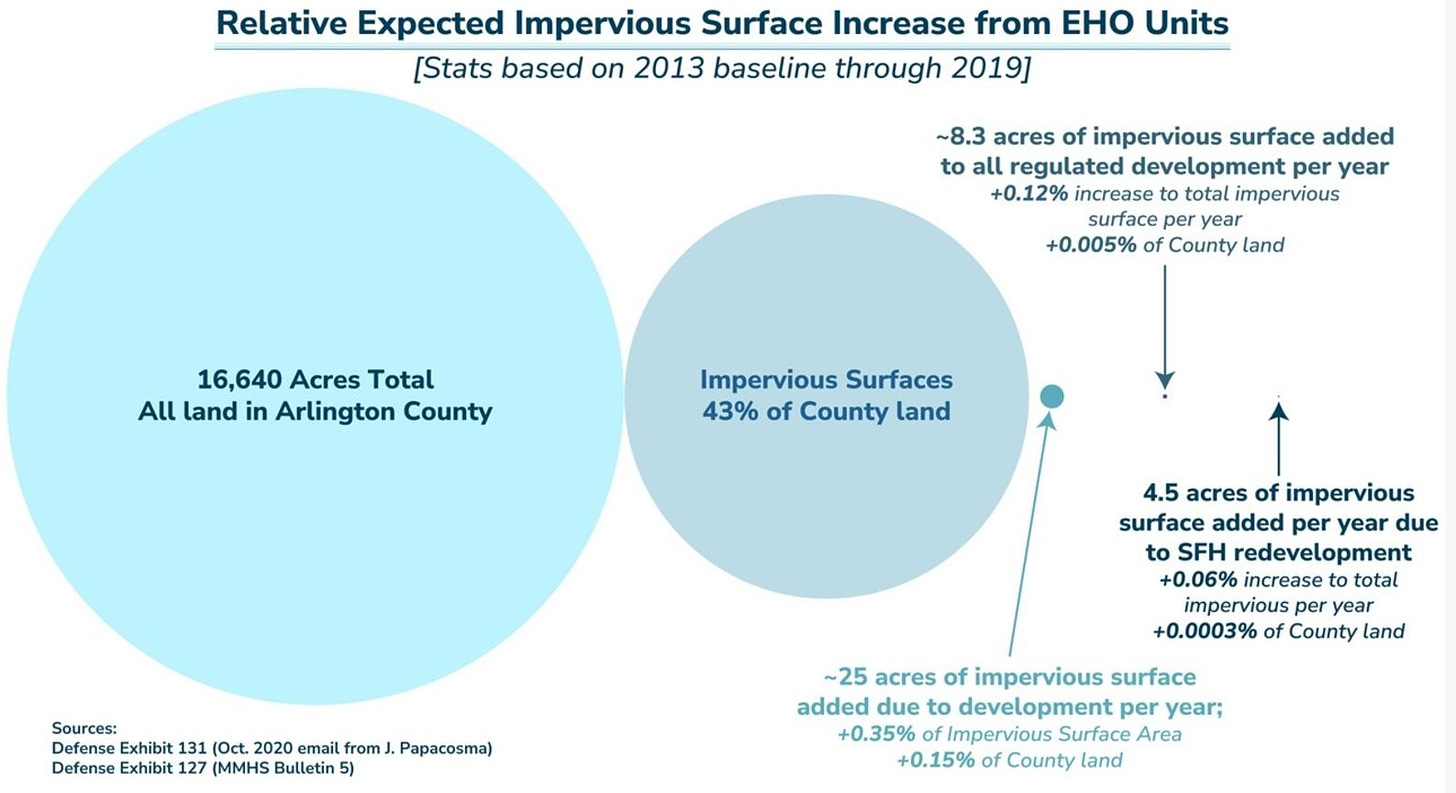
Judge rules Youngkin’s withdrawal from RGGI was unlawful
In 2020, a unified Democratic government in Virginia passed and adopted several pieces of legislation to expedite the transition away from the use of fossil fuels to generate electricity. One of them authorized Virginia to enter into an interstate compact to require utility companies to pay for the right to emit greenhouse gas emission through a series of auctions.
Within an hour of being sworn in as Virginia’s governor in January 2022, Republican Glenn Youngkin signed an executive order signaling his intent to withdraw from the Regional Greenhouse Gas Initiative. Legislation to exit RGGI failed to pass the General Assembly that year and Youngkin opted to use executive means to do so.
This week, retired Judge C. Randall Lowe ruled that Youngkin did not have the authority to end Virginia’s participation.
“The putative repeal of the RGGI Regulation was beyond the statutory authority of the Respondents, and therefore unlawful and without effect,” Lowe wrote in a five-page ruling. (read the ruling)
Soon after the State Air Pollution Control Board voted to leave RGGI on a party-line 4-3 vote, the Southern Environmental Law Center organized a lawsuit on behalf of several groups. They claimed they they would be harmed due to the loss of funding they would receive from Virginia’s share of the auction proceeds. The law that authorized Virginia to join RGGI required 45 percent of the proceeds to go to flood mitigation efforts and 50 percent to go to programs that provide energy efficiency improvements to low-income households.
Virginia participated in Auction 51 through Auction 62 and received over $827 million in proceeds.
The suit was originally filed in Fairfax District Court but transferred to Floyd Circuit Court after several plaintiffs were dismissed for a lack of standing. The only one left was the Association of Energy Conservation Professionals, an organization based in the southwest Virginia locality.
“Petitioner is an association of weatherization professionals whose mission is to provide, promote, and advocate for energy conservation measures on behalf of its members,” Lowe writes in the ruling which found that AECP did have the right to bring the case.
Lowe also wrote that the legislation that authorized participation in RGGI required a corresponding regulation to exist.
“If respondents had merely amended the RGGI regulations in ways that were not inconsistent with the RGGI Act, it is doubtful that their authority to do so could be challenged,” Lowe wrote. “But that is not what happened here.”
The SELC released a statement welcoming the decision.
“Future generations deserve a livable climate,” said SELC Senior Attorney Nate Benforado. “This ruling puts Virginia back on track to address and adapt to climate change at a critical moment, while bringing in critically needed funding to help Virginians all across the Commonwealth.”
The case is likely going to appeal according to a report in a special edition of the Virginia Political Newsletter.
“Governor Youngkin remains committed to lowering the cost of living for Virginians by continuing to oppose the Regional Greenhouse Gas Initiative, which fails to effectively incentivize emission reductions in the Commonwealth,” said spokesperson Christian Martinez. “Instead, it functions as a regressive tax, hidden in utility, bills passed on to all Virginians.”
For more on next steps, read Charlie Paullin’s article on the Virginia Mercury posted yesterday.
Second shout-out: Piedmont Master Gardeners seeking applicants for extension training program
Would you like to deepen your knowledge of gardening and share it with the community in fun and rewarding ways? Then apply to join the 2025 training class for Master Gardener volunteers serving Charlottesville and Albemarle County.
Running from January into April, the 2025 class will be presented in a hybrid format, combining online sessions every Tuesday evening with in-person workshops every other Saturday. The 2026 class will be an entirely in-person format.
The 70 hours of instruction will cover topics ranging from vegetable gardening, ornamental gardening, and fruit growing to soil health, wise water use, and disease and pest management. Find further details here.
The deadline to apply is December 1.
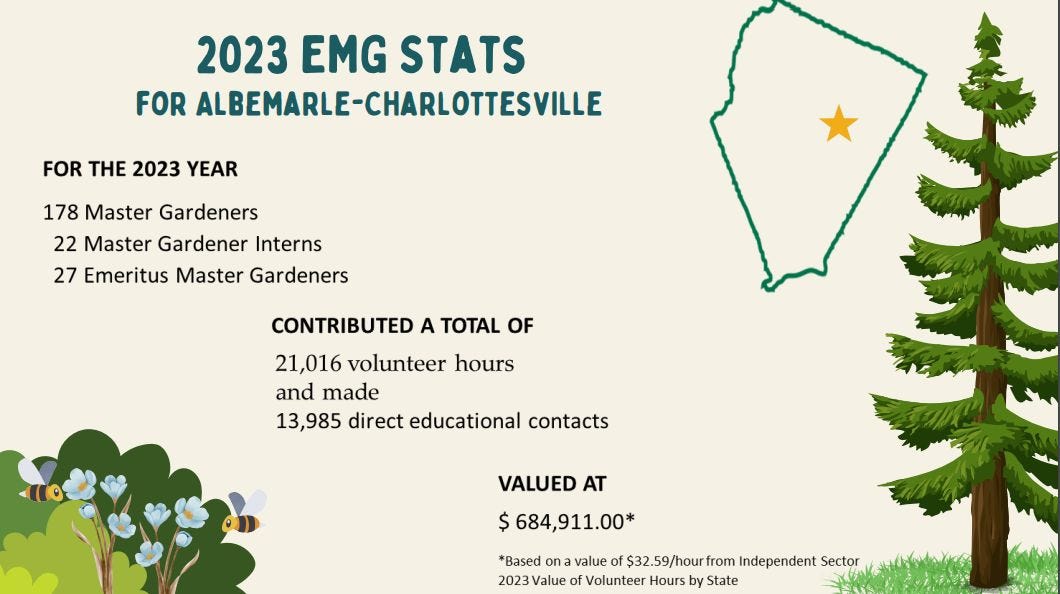
Sanders tells Council he will try to present balanced budget without a tax increase
In recent years, Charlottesville City Council has increased spending on a variety of social and housing programs partially augmented by federal funds intended for relief during and after the pandemic. Spending has also been enabled due to rising property assessments and across the board tax rate increases.
Now the flow of federal American Rescue Plan Act funds has stopped and the city has noticed the first signs of slowing revenue growth in the financial report for the first quarter of the current fiscal year.
There are still three and a half months left until City Manager Sam Sanders has to present a budget to City Council but he’s opting this year to get their input early in the process such as a work session on September 16.
To continue the advance work, Sanders presented the first of three budget briefings to the City Council on November 18. He said by law he must present a balanced budget.
“As hard as it may be and feel right now, the goal is just to make sure that we give some consideration of what the various things are that are contributing to what makes it difficult and or not so difficult,” Sanders said. (read the November 18, 2024 presentation)
For these budget briefings, Sanders is connecting potential new initiatives with a strategic plan framework that Council adopted in September 2023.
“This first session tonight, this evening is on organizational excellence and equity, taking two of your strategic outcome areas and framing them for this section,” Sanders said.
Compensation for employees comes under organizational excellence and there will be around a $5 million increase due to collective bargaining. Sanders said there will be another cost increase related to improving various city operations including the management of collective bargaining. There are currently three recognized unions with a fourth in negotiations at the moment.
“The three existing contracts being police, fire and transit,” Sanders said. “And the new contract is made up of a combination of parks and rec, public works and utilities.”
There are now two full-time employees who work on collective bargaining.
Councilor Lloyd Snook said the public should know that these cost increases would likely be felt anyway given the city’s need to retain its personnel.
“This is involving getting to competitive ranges [for] all of our salaries, which we had not done in decades, literally,” Snook said. “The idea is that we will get our people being paid what is a competitive wage to keep them from going someplace else. The important thing is we're investing in our people. We're not investing in a union, we're investing in our people.”
Sanders said the city will also face increases in various existing contracts and will enter into some new ones. One of these would help the city to keep an inventory of short-term rentals in the city.
“Our Commissioner of Revenue and [Neighborhood Development Services] Director and Zoning Administrator have been working on this for the past few months and have agreed that now is the right time for us to bring a software program in,” Sanders said.
This would be the first step toward the city seeking payments from those that offer short-term rentals and are doing so without permission.
The city is also testing out a program called Neighborly which will attempt to allow them to get a handle on grants for housing and other relationships. Sanders said the city also needs software to help provide analysis in a changing housing market.
“Housing analysis is a request that's also been made for us to be able to look at how we can work with developers who are expressing various concerns about the zoning ordinance and needing to figure out what is feasible and what is not,” Sanders said. “It gives us a chance to analyze what is the right investment for us to make into a project that is being brought to us.”
Sanders said another investment to be made is a joint assessment of homelessness services with Albemarle County. Another would be whatever investments are needed to create a regional transit authority.
“So what I would hope to be able to do is to figure out a way to afford all of the things that are under this new service contract area because this is the work,” Sanders said. “This is what you all have prioritized in your strategic outcomes.”
Turning to new initiatives under the Equity heading in the strategic plan framework, Sanders reminded Councilors of the “community interventions” he introduced at their October 21 work session back.
Charlottesville City Manager Sanders announces upcoming “community interventions” including $5 million for the Salvation Army, October 23, 2024
Sanders briefs Council on other community interventions such as purchase of portable restrooms, November 1, 2024
At the November 18 work session, Sanders said the city would commit to $200,000 a year to pay the Salvation Army for lost revenue if they convert a thrift store on Cherry Avenue into a low-barrier shelter. He also said the city would commit $250,000 to the Blue Ridge Area Coalition for the Homeless to allow them to hire more staff.
“That would be an annual grant that would be made to them and that is outside of the competitive nature of some of our grant work,” Sanders said.
Sanders said the city would also commit a half-million a year to an organization to run the low-barrier shelter. That all adds up to about $1 million a year. This does not include whatever funds will come from the American Rescue Plan Act and the expected FY24 surplus.
Sanders said the city will use $215,000 from the remaining ARP funds to add to the contribution to the city’s Pathways Fund to cover a shortfall for this year.
“The Pathways Fund is our annual operating fund of providing direct support to individuals that are having some sort of difficulty in maintaining their household finances,” Sanders said.
Sanders also walks to know if Council would want to increase the annual contribution for the pathways fund from the $1 million allocation each year.
Another new initiative is $60,000 a year for an emergency hotel program.
Compliance with the Americans with Disabilities Act is also under the Equity header. The city has been working on an ADA transition plan.
“I have asked our budget director to add a $2 million line item in the CIP for each of the next five years to demonstrate our commitment to a culture of compliance around ADA,” Sanders said. “I would hope that that means that people would see that we are really prioritizing this matter because we have not done this before.”
Sanders anticipated adding $2 million to the capital improvement program to implement the ADA transition plan.
Council’s next budget briefing will be on December 2 with a look at housing.
The Planning Commission will get a look at the draft capital improvement program at a work session on on November 26 and will have a public hearing on December 10. There’s a community budget forum on December 12. Council will have a joint session with the Charlottesville School Board on December 19.
“This is a conversation for schools to help us understand what their particular drivers may be early,” Sanders said.
Sanders said the city is anticipating there will be a high ask from the school system because of their own collective bargaining.
The city manager won’t present his budget until March 4.
Mayor Juandiego Wade asked Sanders what would keep him up at night between now and then. Sanders
“It is my desire that I can bring to you a balanced budget that does not rely on a tax increase,” Wade said. “That's what I'd like to be able to do. I am not confident that I'll be able to do that.”
Sanders said he is aware that many property owners are beginning to struggle with higher property taxes caused by several years of high assessment increases. Council has also raised the real property tax rate in two consecutive budget cycles.
“As usual, it's going to be a very challenging budget process, but that's why they elected us and paying us the big bucks,” said Mayor Wade. “So we're looking forward to that discussion.”
For more stories on the budget development process in Charlottesville, take a look at the archive on Information Charlottesville.
Reading material:
Monticello commemorates Lafayette’s historic visit with 200-year re-enactment, Pimm Dyar, CBS19, November 17, 2024
Half of IIJA funds unspent with Trump set to take office, Julie Strup, Construction Dive, November 19, 2024
Judge is ready to rule in Charlottesville zoning case, but opens door to more evidence, Sean Tubbs, C-Ville Weekly, November 20, 2024
A year after Charlottesville City Manager’s ‘homeless intervention strategy,’ a bold plan to assist area’s growing unhoused population unfolds, Erin O’Hare, Charlottesville Tomorrow, November 20, 2024
City Manager: There’s still no plan for Belmont property originally eyed for homeless shelter, Erin O’Hare, Charlottesville Tomorrow, November 20, 2024
That way goes #766
The original intent of these endnotes was to communicate meta-information about what’s happening in the business I set up in the summer of 2020. I suppose I’ve done that, but I’ve also used it to sort of offer thoughts here and there about journalism or whatever.
Today will be a fairly quick one because I’m ready to get on to the next one. So much happened this week and I missed some of it because I was out of my usual space. Yet, I didn’t stop work.
Should I have done so? Perhaps. But I relax by doing research because on some level I became a journalist because I wanted to explore the world around me. I suppose I’ve done that, and I hope to be able to do so for a while.
These endnotes also are a reminder that I do rely on paid subscriptions to keep the work going. About 80 percent of the readership doesn’t pay, but the 20 percent makes up for it. That ratio has kept up for four years and I’m hopeful to keep it up.
I want to use this particular endnote that if you sign up for a paid subscription, there is an option to turn off the auto-renew feature. I’m going to make sure everyone knows about this because I know it puts some people off. I also want people to know I’m exploring other ways to contribute.
If you’d like to become a paid Substack supporter, Ting will match your initial payment. If you sign up for service and you are within Ting’s service area, enter the promo code COMMUNITY you’re going to get:
Free installation
A second month for free
A $75 gift card to the Downtown Mall




